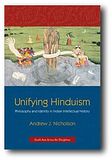Unifying Hinduism
Nicholson, Andrew J.:
Unifying Hinduism : philosophy and identity in Indian intellectual history / Andrew J. Nicholson. - New York : Columbia University Press, 2010. - ca. 280 S. - (South Asia across the disciplines ; 3)
ISBN 978-0-231-14986-0 (cloth)
US$ 45,00 / £ 31,00
DDC: 294.509
-- Angekündigt für Oktober 2010 --
Beschreibung
Some postcolonial theorists argue that the idea of a single system of belief known as "Hinduism" is a creation of nineteenth-century British imperialists. Andrew J. Nicholson introduces another perspective: although a unified Hindu identity is not as ancient as some Hindus claim, it has its roots in innovations within South Asian philosophy from the fourteenth to seventeenth centuries. During this time, thinkers treated the philosophies of Vedanta, Samkhya, and Yoga, along with the worshippers of Visnu, Siva, and Sakti, as belonging to a single system of belief and practice. Instead of seeing such groups as separate and contradictory, they re-envisioned them as separate rivers leading to the ocean of Brahman, the ultimate reality.
Drawing on the writings of philosophers from late medieval and early modern traditions, including Vijnanabhiksu, Madhava, and Madhusudana Sarasvati, Nicholson shows how influential thinkers portrayed Vedanta philosophy as the ultimate unifier of diverse belief systems. This project paved the way for the work of later Hindu reformers, such as Vivekananda, Radhakrishnan, and Gandhi, whose teachings promoted the notion that all world religions belong to a single spiritual unity. In his study, Nicholson also critiques the way in which Eurocentric concepts—like monism and dualism, idealism and realism, theism and atheism, and orthodoxy and heterodoxy—have come to dominate modern discourses on Indian philosophy. [Verlagsinformation]
Inhalt
Acknowledgments. ix
List of Abbreviations. xi
1. Introduction. 1
2. An Alternative History of Vedānta. 24
3. Vijñānabhikṣu's "Difference and Non-Difference Vedānta". 39
4. A History of God in Sāṃkhya and Yoga. 67
5. Reading Against the Grain of the Sāṃkhyasūtras. 84
6. Yoga, Praxis, and Liberation. 108
7. Vedānta and Sāṃkhya in the Orientalist Imagination. 124
8. Doxography, Classificatory Schemes, and Contested Histories, 144
9. Affirmers (Āstikas) and Deniers (Nāstikas) in Indian History. 166
10. Hindu Unitiy and the Non-Hindu Other. 185
Notes. 207
Bibliography. 239
Index. 251
Autor

ANDREW J. NICHOLSON is assistant professor of Hinduism and Indian intellectual history in the Department of Asian and Asian American Studies at Stony Brook University. Faculty page.
Quellen: Columbia University Press; Amazon; WorldCat; Google Books.
Ähnlich
- Wege zum Heil(igen)?
- Davis: The Bhagavad Gita
- Rao: Re-figuring the Rāmāyaṇa as Theology
- Oliver: Hinduism and the 1960s
- Purāṇas, History and Itihāsas
- Collins: The Head Beneath the Altar
- Okita: Hindu Theology in Early Modern South Asia
- Banāras Revisited
- Schwarz Linder: The Philosophical and Theological Teachings of the Pādmasaṃhitā
- Mapping the Chronology of Bhakti

